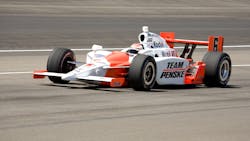What trucking can learn about fuel efficiency from auto racing
It’s interesting to me that people talk about how auto racing burns fuel just for the fun of it—for the enjoyment of the spectators. I see racing more akin to what NASA does. Sure, a lot of money is spent at the U.S. space agency, but many of the technologies that found their way into the space shuttles, for example, ended up having applicability in a wide variety of other industries. Lots of folks benefit from the learnings of a NASA mission.
I think this is also true of auto racing and trucking. I first went to the Indianapolis 500 as a 10-year-old kid when my grandfather took me. Even then I was captivated by the sport. For the past 15 years I have been at the Indy 500 every year without fail. It's funny because I am not really a car guy, and I am definitely not a speed guy. But I continue to marvel at how far the race teams stretch the technology available to them. When you think about it, the things they do to go fast are the same things you need to do to save fuel—focus on aerodynamics, run on low rolling resistance tires, spec the right power train. The Indy cars are trying to get better fuel economy in addition to trying to go super fast because better fuel economy means more miles between pit stops. And fewer pit stops means more time on the track.
See also: The 'messy middle' isn't bad
I think, as we work on decarbonizing freight, there are lessons to be learned from all kinds of places, and I think auto racing is one of those places.
There were a couple of big announcements that came out in conjunction with this year’s Indy 500. Penske had the tires for its race car shipped from Firestone’s distribution center to the track on two electric trucks. IndyCar installed a high-speed charging station at the speedway so the trucks could recharge.
The other announcement was from Shell, the longtime sponsor of fuel for the race. Shell says that for 2023 it is switching to low-carbon fuel for cars in the IndyCar North American racing series.
There were other signs that the Indy 500 and IndyCar are making changes to be more sustainable. And I just bet trucking can learn a few things from our friends on the oval track.
Michael Roeth has worked in the commercial vehicle industry for nearly 30 years, most recently as executive director of the North American Council for Freight Efficiency. He serves on the second National Academy of Sciences Committee on Technologies and Approaches for Reducing the Fuel Consumption of Medium and Heavy-Duty Vehicles and has held various positions in engineering, quality, sales, and plant management with Navistar and Behr/Cummins.
About the Author

Michael Roeth
Executive Director
Michael Roeth is the executive director of the North American Council for Freight Efficiency. He serves on the second National Academy of Sciences Committee on Technologies and Approaches for Reducing the Fuel Consumption of Medium and Heavy-Duty Vehicles and has held various positions with Navistar and Behr/Cummins.
